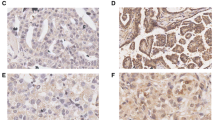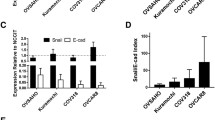Abstract
Objective
To evaluate the inhibitory effect of Endostatin on ovarian cancer cell line SKOV3 and to investigate the possible mechanism of the inhibition.
Methods
Using MTT, transmission electron microscope (TEM) and immunocytochemistry, the effects of Endostatin on the proliferation of SKOV3 cells were studied. Nude mice were subcutaneously implanted with SKOV3 cells. The cell apoptosis of implanted tumor was detected by TUNEL and TEM. The expressions of bcl-2 and bax in implanted tumor tissues were measured by RT-PCR and immunohistochemistry.
Results
Endostatin significantly inhibited the proliferation of SKOV3 cells in vitro (P<0.01) and induced cell apoptosis, whereas the expressions of bcl-2 and bax were not changed obviously in SKOV3 cell treated with Endostatin. The mean tumor weight of Endostatin treated group was markedly lower than that of PBS control group (P<0.05). The expression of bcl-2 was down-regulated in Endostatin treated group, but bax was not influenced.
Conclusions
The results demonstrated that Endostatin might have anti-tumor effect on ovarian carcinoma. One of the important mechanisms of Endostatin effect of anti-angiogenic and anti-tumor activities might involve regulating the bcl-2/bax expression and inducing apoptosis.
Similar content being viewed by others
References
O’Reilly MS, Boehm T, Shing Y, et al. Endostatin: an endogenous inhibitor of angiogenesis and tumor growth[J]. Cell 1997; 88: 277–85.
Kuroiwa M, Takeuchi T, Lee JH, et al. Continuous versus intermittent administration of human endostatin in xenografted human neuroblastoma[J]. J Pediatr Surg 2003; 38: 1499–505.
Park WH, Seol JG, Kim ES, et al. Arsenic trioxide mediated growth inhibition in MC/CAR myeloma cells via cell cycle arrest in association with induction of cyclin-dependent kinase inhibitor, p21 and apoptosis[J]. Cancer Res 2000; 60: 3065–71.
Wu J, Fan DM. Angiogenesis and antiangiogenesis therapy[J]. Shijie Huaren Xiaohua Zazhi(Chin) 2001; 9: 316–21.
Abdollahi A, Lipson KE, Sckell A, et al. Combined therapy with direct and indirect angiogenesis inhibition results in enhanced antiangiogenic and antitumor effects[J]. Cancer Res 2003; 63: 8890–8.
Chillemi F, Francescato P, Ragg E, et al. Studies on the structure-activity relationship of endostatin: synthesis of human endostatin peptides exhibiting potent antiangiogenic activities[J]. J Med Chem 2003; 46: 4165–72.
Boehm T, Folkman J, Browder T, et al. Antiangiogenic therapy of experimental cancer does not induce acquired drug resistance[J]. Nature 1997; 390: 404–7.
Fukumoto S, Morifuji M, Katakura Y, et al. Endostatin inhibits lymph node metastasis by a down-regulation of the vascular endothelial growth factor C expression in tumor cells[J]. Clin Exp Metastasis 2005; 22:31–8.
Nyberg P, Heikkila P, Sorsa T, et al. Endostatin inhibits human tongue carcinoma cell invasion and intravasation and blocks the activation of Matrix Metalloprotease-2,-9, and-13[J]. J Biol Chem 2003; 278:22404–11.
Wilson RF, Morse MA, Pei P, et al.Endostatin inhibits migration and invasion of head and neck squamous cell carcinoma cells[J]. Anticancer Res 2003; 23:1289–95.
Ren B, Wang Y, Ndebele K, et al. Multiple signaling is involved in endostatin-mediated apoptosis in ECV 304 endothelial cells[J]. Front Biosci 2005; 10:1089–97.
Wu Y, Yang L, Hu B, et al. Synergistic anti-tumor effect of recombinant human endostatin adenovirus combined with gemcitabine[J]. Anticancer Drugs 2005; 16:551–7.
Isayeva T, Ren C, Ponnazhagan S. Recombinant adeno-associated virus 2-mediated antiangiogenic prevention in a mouse model of intraperitoneal ovarian cancer[J]. Clin Cancer Res 2005; 11:1342–47.
Author information
Authors and Affiliations
Corresponding author
Additional information
Foundation item: This work was supported by the Key Problem Research Project of Hei-Long-Jiang Province(No. 20020101).
Biography: LIU Mei-mei(1977–), female, candidate doctor of medicine, The Second Affiliated Hospital, Harbin Medical University, majors in gynecology.
Rights and permissions
About this article
Cite this article
Mei-mei, L., Li-hua, S., Pei-ling, L. et al. Effects and mechanisms of endostatin on the growth of ovarian cancer SKOV3 cells in vitro and in vivo . Chin. J. Cancer Res. 18, 132–137 (2006). https://doi.org/10.1007/s11670-006-0132-8
Received:
Accepted:
Issue Date:
DOI: https://doi.org/10.1007/s11670-006-0132-8




